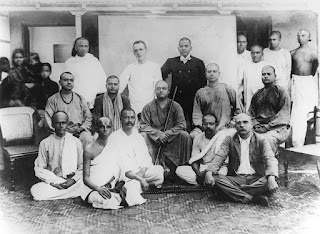 When Swamiji declared that his religion was one of which Christianity was an offshoot and Buddhism a rebel child, he added "Three books I loved best and often I carried them with me, viz., the Gita, the Light of Asia by Edwin Arnold and the Imitation of Christ by Thomas-a-Kempis." It was then, he showed the great harmony that existed in the teachings of all great Religions. It seems now, that the great Parliament of Religions, held at Chicago, was a special opportunity created by God for the preaching of this great harmony by Swami Vivekananda. Before Swami Vivekananda appeared on the stage of this world, there were distant and hazy talks about there being elements of truth in all religions, but no one really understood wherein the great harmony consisted and how it was a real harmony and not an empty phrase, like 'Universal Brotherhood ' so often used for the purpose of exploitation. Even the harmonious evolution of religious thought as manifest in the doctrines of the three schools of Vedanta was not clearly known, until Swamiji showed their real significance.
When Swamiji declared that his religion was one of which Christianity was an offshoot and Buddhism a rebel child, he added "Three books I loved best and often I carried them with me, viz., the Gita, the Light of Asia by Edwin Arnold and the Imitation of Christ by Thomas-a-Kempis." It was then, he showed the great harmony that existed in the teachings of all great Religions. It seems now, that the great Parliament of Religions, held at Chicago, was a special opportunity created by God for the preaching of this great harmony by Swami Vivekananda. Before Swami Vivekananda appeared on the stage of this world, there were distant and hazy talks about there being elements of truth in all religions, but no one really understood wherein the great harmony consisted and how it was a real harmony and not an empty phrase, like 'Universal Brotherhood ' so often used for the purpose of exploitation. Even the harmonious evolution of religious thought as manifest in the doctrines of the three schools of Vedanta was not clearly known, until Swamiji showed their real significance.Said he: "Three great teachers are the Living Gods on Earth— Sri Krishna, Buddha and the Christ. All these great teachers are true, because each one has come to preach a great idea. Sri Krishna was the oldest of these, and his teachings as given in the immortal Gita are the noblest, grandest and all-comprehensive. The central idea is non-attachment to worldly things. Let the heart's love be bestowed on only One who never changeth and that is God. For any love given to things of the world, to father, mother, children, wife or husband, to wealth, name and fame with a feeling of attachment leads to misery. Hence God alone is the only attraction, no other, and all work should be dedicated to him. "Sarvam Srikrishnarpanamasthu." With this feeling of complete faith in God, one should work. "Work, work day and night, says the Gita," Swamiji used to say: "Flying from work is never the way to peace." Gita begins with an admonition to Arjuna not to shrink from one's duties but to take them up manfully and not think of the result.
"To work alone you have the right but not to the results thereof." The lines—
"Ours is not the question why
Ours is but to do and die,"
were very often quoted by the Swamiji. He further said "Do not pay much attention to the nature of the work you have to do. Ask your mind, if you are unselfish? if you are, never mind anything, plunge in and do your duty near at hand and you will realise the truth of the Gita.'' "Whosoever in the midst of immense activity finds intense peace, whosoever in the midst of the greatest peace finds the greatest activity, he is a Yogi, he is a great soul, he has arrived at perfection." Further the Swamiji continued, "Every work is sacred. There is no duty in this world which we have any right to call menial; a sweeper's work is quite as good as that of the Emperor on his throne."
To be continued..
- DR. M. C. NANJUNDA ROW
(Vedanta Kesari - Aug 1914)
(Vedanta Kesari - Aug 1914)
Celebrating 50 Glorious Years of the Vivekananda Rock Memorial : विवेकानन्द शिला स्मारक - एक भारत विजयी भारत : www.vrmvk.in
---
You received this message because you are subscribed to the Google Groups "Daily Katha" group.
To unsubscribe from this group and stop receiving emails from it, send an email to daily-katha+unsubscribe@googlegroups.com.
To view this discussion on the web, visit https://groups.google.com/d/msgid/daily-katha/CAJguLpXBpaUJW%2BaGipxSLM19xQeHPJhHZsAMf7UX1b9D9Fyr4A%40mail.gmail.com.
No comments:
Post a Comment